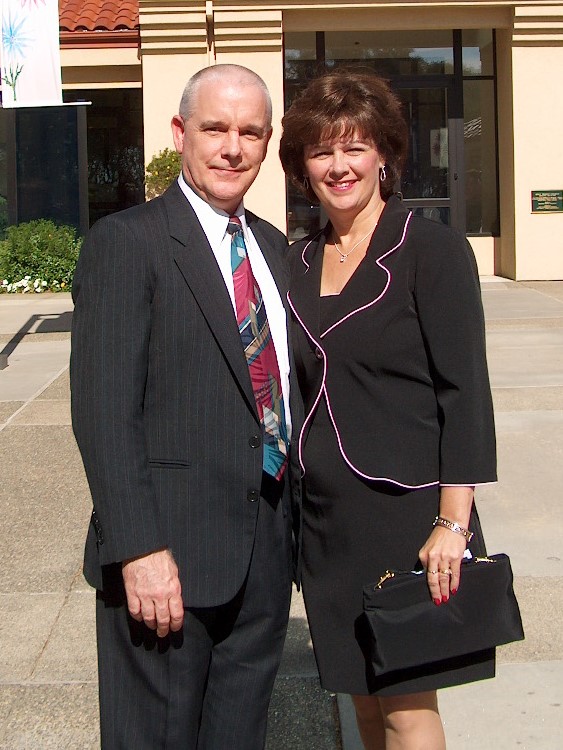By Tom Tait
 Multiple System Atrophy ended our love story, but not our love for each other. My wife Liz was diagnosed with possible MSA at age 57 on November 26, 2013, at the University of Pennsylvania’s Parkinson’s Disease and Movement Disorder Center in Philadelphia. Five years later, she passed at 62 on December 20, 2018. She donated her brain for research, and I received the autopsy report confirming the diagnosis of MSA-C. Happily married to your high school sweetheart for 40 years, you honestly don’t want to accept the diagnosis of a terminal brain disease.
Multiple System Atrophy ended our love story, but not our love for each other. My wife Liz was diagnosed with possible MSA at age 57 on November 26, 2013, at the University of Pennsylvania’s Parkinson’s Disease and Movement Disorder Center in Philadelphia. Five years later, she passed at 62 on December 20, 2018. She donated her brain for research, and I received the autopsy report confirming the diagnosis of MSA-C. Happily married to your high school sweetheart for 40 years, you honestly don’t want to accept the diagnosis of a terminal brain disease.
I have attended, facilitated, and co-facilitated over 150+ support group webinars for Carepartners of People with Terminal Brain Diseases, including MSA, CBD, and PSP. I have heard in so many words, “I cannot accept that my husband, wife, friend, lover, brother, sister, mother, father, you name it, has a terminal brain disease.” Yes, the operative word is “accept.” So, we mentally struggle with keeping it together and trying to find a cure. However, right now, at best, we can make the MSA journey as comfortable as possible for our loved ones as long as we can accept each stage along the way. Come to find out, there are a series of emotions that lead to acceptance. The five stages of the grief model by Swiss American psychiatrist Kubler Ross are denial, anger, bargaining, depression, and acceptance.
It is interesting that we start talking about grief when have not lost our loved one yet. However, as I learned from a social worker, we start grieving as soon as we hear the word terminal disease.
People often think that the stages of grief last weeks or months. We forget that the stages of grief are responses to feelings that can last for minutes or hours as we flip in and out of one and then another. We do not enter and leave each stage in a linear fashion. We may feel one, then another, and back again to the first one. Keep this in mind as I cover the five stages of grief on the way to acceptance.
- Denial: I did not know how grief worked, but Liz and I discovered there are stages. When confronted with a terminal disease, you go into denial, one of the first stages of grief. Before learning about a terminal illness, I thought grief was when you lost someone. In this case, they are still here, but you start grieving as soon as you learn the MSA journey ends in death. Initially, you are shocked, which helps us cope and make survival possible.
- Anger: Once you learn what will happen along the MSA journey, you become angry. Angry at the world, your religion, and that it’s happening to us. Angry that your future together is being denied. Angry that your children’s mother is going to die. Angry that everything that you were or are is changing. Angry that something beyond your control is taking control of your plans together. Anger is just another indication of the intensity of your love.
- Bargaining: The third stage involves the hope that the individual can avoid a cause of grief. Perhaps people facing less severe trauma can bargain or seek compromise. Usually, the negotiation for an extended life is made in exchange for a reformed lifestyle. Examples include the terminally ill person who “negotiates with God” to attend a daughter’s wedding, an attempt to bargain for more time to live in exchange for a reformed lifestyle, or a phrase such as “If I could trade their life for mine.”
- Depression: “I’m so sad; why bother with anything?”; “I’m going to die soon, so what’s the point?”; “I miss my loved one; why go on?” During the fourth stage, the individual despairs at recognizing their mortality. In this state, the individual may become silent, refuse visitors and spend much of the time mournful and sullen.
- Acceptance: Acceptance is often confused with being “all right” or “OK” with what has happened. This statement is not the case. Most people do not ever feel okay or all right about the fact of going to lose a loved one. This stage is about accepting the reality that our loved one will slowly lose their ability to talk and walk. The eventuality is death—recognizing that this new reality is the permanent reality. We will never like this reality or make it OK, but eventually, we can choose to accept it. We can learn to live with it. In resisting this new norm, many people first want to maintain life as it was before. In time, through bits and pieces of acceptance, we see that we cannot hold on to the past. It has been forever changed, and we must readjust. We must learn to reorganize roles, re-assign them to others or take them on ourselves.
It does not become easier when we accept the challenges that MSA will present. Still, it does allow us to live fully, understanding that we have no control over where this is leading. By embracing acceptance, we can make decisions that will make the best of the remainder of our lives.
While it may sound strange, MSA allows us time to say goodbye to our loved ones.
I wish you all serenity… Tom
